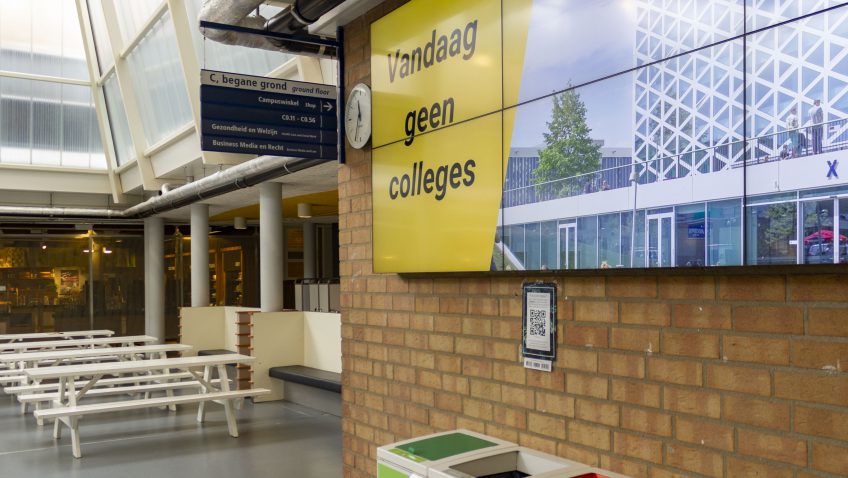Education will start again on the campus at the 1st of September. But what Windesheim will look like is still uncertain. One thing is clear: Windesheim will only be left with a quarter of all the available space. Henk Hagoort has asked the divisions for their plans on what has to take place, “they are the best judges of that.”
Chairman of the Executive Board Henk Hagoort is impressed by how students and employees have responded to the crisis. “It took all of us by surprise. And still you can see people, I would say ‘on adrenaline’, are capable of incredible things. I am deeply impressed by the manner in which the development of education at a distance has developed over the last few months. I do realize that it is also very taxing. And now that we are over our adrenaline-high, we realize that we will have to keep this up for a while. This gives us the feeling like: “Help! How are we going to keep this up for a longer period of time?”
How is communication with other educational institutions and the ministry?
“It was relatively easy for the last period: nothing was allowed, or at least very little. Now we are slowly coming out of the lockdown and that leaves us with a lot of grey areas. What is allowed and what is not? In the six-feet distance society, space will be scarce. How can we divide this scarce space optimally? We will make agreements about this with the government and educational institutions. And within Windesheim itself with the divisions and the Central Participation Council. That will not be simple. Take, for example, the decisions that vocational education students (in Dutch MBO) who will not have graduated with a degree will be allowed to start at universities of applied science in the next year. Something like this is easily said. But once it is elaborated on, several institutions and organizations have to get involved. However, overall, I am impressed with the compactness with which these institutions and organizations have responded to the crisis. The government provides us with new steps every week, and there is no other way for this. I find it surprising how quickly the ministries manage to adapt.”
Are there guidelines for the first period that starts on the 1st of September?
“I haven’t received any clear guidelines from the government about how things should be done from the 1st of September onwards. Everything we have got from the government so far is for the weeks leading up to that. The opening up of vocational education will be evaluated by The Netherlands Association of Universities of Applied Sciences. Public transport complicates this. Recently we received a travel protocol; we will have a close look at that.”
The available space per student or employee will definitely be smaller…
“Before the summer, we will use all the available space to the exams that are impossible to be done at a distance. We also assume that at Windesheim, because of the six-feet rule, we will be left with about a quarter of our available space after the 1st of September. Based on that, we will plan our scenarios. We recently spoke to the management teams of the divisions about this. What can we do within these new borders? The Executive Board wants the study programmes to have as much room as possible to fill in what they want to do and how they plan on doing this: will they concentrate on lessons or exams on the campus? Will there be more ‘live’ classes for first years than for third years? Study programmes can best judge this themselves. I expect to have the first version of our scenario at the end of may, which we can then propose to all the teams across Windesheim.”
What does all of this mean for the Strategical Course?
“I was raised with the idea that we must turn bad situations to our advantage. We can learn some useful lessons from this crisis that may possibly connect to our image of the future. I will give an example. We all discussed that we all should think about the extent of the classic classroom setting/ the classical form of education, and that it should still be at the centre. Now, we are forced to consider this properly. I am not saying that I want to use the Corona crisis to push some of the elements of our Strategical Course. But I think we can learn a lot from this. The crisis is also an evil that brings a lot of disadvantage. We cannot see our co-workers nor our students and that is not fun. But, out of that evil, good things can come that may benefit us in the Course that we have set out.”
In conclusion, The Hague spends a lot of money and is indebting itself. This is making us head for a recession. There is talk of future cuts in funding that may be necessary, in education for example. Do you see this as a possible danger?
“In the financial report that the government gave us this spring, which had the financial budget for 2020/2021, shows that there are no cuts to funding ready to be enacted for this period. And, there are the elections that take place in the spring of 2021. Then there will certainly be discussions about the necessary budget cuts and several political parties will voice their opinion about where these cuts should take place. Education will probably be named as well. However, I think that compared to the crisis of 2008/2009, the societal climate has changed. I think people now feel that we need to look after our healthcare and education. And rightfully so.
